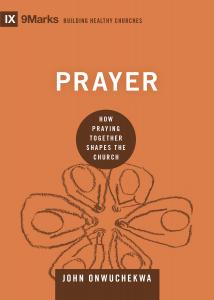Prayer: How Praying Together Shapes the Church is one of the latest editions in the Building Healthy Churches series put out by 9Marks. Like other books in the series, it is short, well-written, and aimed at correcting a need or lack in the contemporary Evangelical church.
And holy cow, is this need a big one. I don’t have statistics in front of me (and Barna has not yet taken a poll on the matter—I know this I asked them), but I would guess than in the average 90 minute Evangelical church service, less than three minutes are dedicated to prayer. Honestly, that estimate is a generous one. If your church spends a full 180 seconds in public, corporate prayer, I would imagine you are in the minority.

There are historical reasons for this. When Evangelicals began to jettison liturgies in the 19th century (occasionally for good reasons, more often not), the pre-determined structure that included time for specific kinds of prayer in a church service began to weaken. When the marketers rose to prominence in the mid-to-late 20th century, what was left of corporate prayer didn’t stand a chance. Music is always > prayer (and Scripture reading, for that matter) when your church service is aimed and doing what you think the non-Christians you’re trying to reach want to hear.
But in the course of stripping our church services of prayer, we’ve lost something deeply important to our lives: the chance to slow down and reflect as we praise, confess, and ask as a church. When we don’t pray, important parts of us begin to atrophy:
“Prayer humbles us like nothing else. When we pray, we’re reminded that prayer is not like other disciplines in the world that require impressive aptitude and increased exercise to bring about great results…
Prayer isn’t like that because great results don’t come as a direct result of a grueling regimen and expertise. Great results come from our gracious Ruler, the great Wearder and Reward of his people who cry out to him.” (23)
Onwuchekwa (rightly) tells us that prayer, instead of being like training for a competition, is like breathing. You can refine it (especially if you’re doing something else), but you don’t “train” for it. It’s something that you do, with serious consequences if you stop. This little book helps us see the Biblical mandate to pray; the Biblical model for prayer; and the theological reasons for/results of doing so.
One thing Onwuchekwa doesn’t go into in this book are specific details. He gives a broad overview (the traditional “ACTS” pattern of prayer), as well as some guidelines for organizing/leading a prayer meeting. I’ve never organized or lead a prayer meeting, but it all sounded like good advice to me. The one thing he could have included more of is how individuals ought to pray in a church service. That is, if the pastor calls on me to lead a prayer in a morning church service, what should I do? A chapter on specifics here would have filled out the book a bit.
Even without such a chapter, this little book is excellent. Pick it up, be convicted by our personal and corporate prayerlessness, and let us modify our prayer life accordingly.
Dr. Coyle Neal is co-host of the City of Man Podcast and an Associate Professor of Political Science at Southwest Baptist University in Bolivar, MO.













